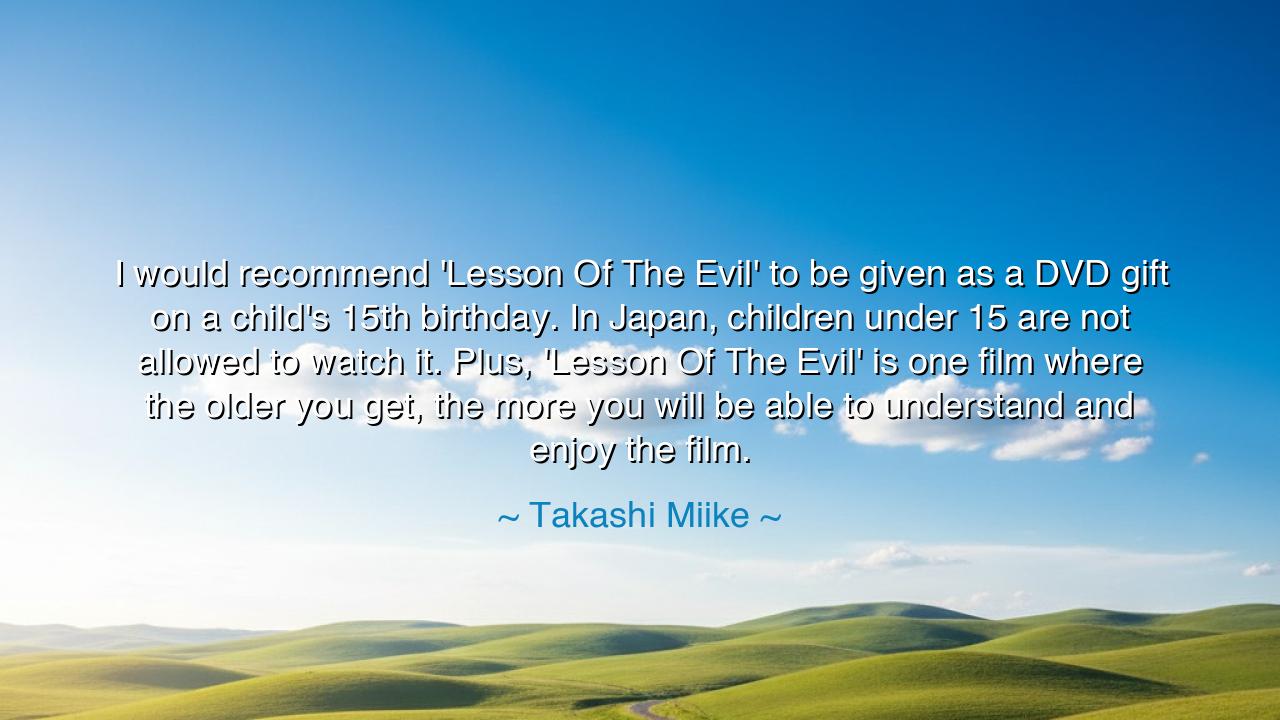
I would recommend 'Lesson Of The Evil' to be given as a DVD gift
I would recommend 'Lesson Of The Evil' to be given as a DVD gift on a child's 15th birthday. In Japan, children under 15 are not allowed to watch it. Plus, 'Lesson Of The Evil' is one film where the older you get, the more you will be able to understand and enjoy the film.






Host: The room was dimly lit, the soft light casting gentle shadows on the walls. Outside, the quiet of the evening had settled in, the occasional sound of traffic outside a distant hum. Jack sat in a chair by the window, his gaze distant, lost in thought. Jeeny, sitting across from him, seemed to be reflecting on something as well, her fingers idly tracing the rim of her coffee cup. The space between them was peaceful, yet there was a quiet expectation, as though a conversation was about to unfold.
Host: Takashi Miike’s words floated into the room: “I would recommend 'Lesson Of The Evil' to be given as a DVD gift on a child's 15th birthday. In Japan, children under 15 are not allowed to watch it. Plus, 'Lesson Of The Evil' is one film where the older you get, the more you will be able to understand and enjoy the film.” Miike’s words were a striking invitation to look deeper into the complexity of both the film and the audience who experiences it—suggesting that maturity and experience are required to truly grasp its meaning.
Jeeny: She looked up from her cup, her voice soft but filled with curiosity: “You ever think about how certain things only make sense as you get older? Like Miike’s talking about a film that children under 15 aren’t allowed to watch, but as you age, you begin to understand and even appreciate it more. It’s like how life itself works—some things just don’t hit the same until you’ve had the experiences to really understand them.”
Jack: His voice was thoughtful, almost reflective: “I get that. It’s like how some movies, books, or experiences only resonate when you’ve lived through certain things. When you’re younger, things might seem dramatic or intense, but with time, you begin to see the nuances, the complexity of it all. It’s the same with people, right? The more you grow, the more you can see the layers beneath the surface.”
Jeeny: She smiled slightly, her voice gentle but full of understanding: “Exactly. We often don’t have the perspective when we’re younger. There are parts of life, parts of art, that are completely lost on us until we’ve experienced enough to understand the depth of them. It’s why some films, books, or stories that might seem trivial or difficult when you’re young make more sense when you’re older. We get to see beyond the surface, into the things that are unspoken, the things that require a certain amount of life experience to truly appreciate.”
Host: The room seemed to quiet further, the weight of the conversation settling between them. The idea that age and experience shaped not just our perspective on the world, but also how we engage with art, film, and even the emotional complexities of life, felt like a subtle truth, one that didn’t need to be explained but simply felt.
Jack: His voice was softer, almost revelatory: “I guess that’s why films like that one Miike mentions are difficult to grasp when you’re young. You might understand the surface plot, the actions, but the subtext, the real emotions behind the story, aren’t something you can comprehend fully until you’ve lived through some of that darkness or complexity yourself. You don’t know what it feels like to truly be lost, or to understand the motivations behind certain actions until life teaches you.”
Jeeny: She nodded, her expression serene, almost as if she had been carrying this idea for some time: “Exactly. The older we get, the more we connect the dots. We begin to understand that things are never as simple as they seem at first glance. What once seemed extreme or confusing in a film or in life itself becomes clearer when you’ve walked those paths, when you’ve seen the contradictions that exist in people and situations.”
Host: The room was quiet now, the world outside continuing its steady hum, but inside, there was a shift—a recognition that both art and life had layers that only became visible with time, patience, and experience. Jack and Jeeny, though having approached the conversation from different angles, seemed to have reached the same conclusion: that depth, understanding, and appreciation are often earned through the journey of life itself.
Jack: His voice, now more calm and receptive, carried the weight of that realization: “Maybe that’s why some art, some stories, don’t really make sense when we’re younger. They only start to click when we’ve lived enough to understand the shadows that exist in life. It’s not just about what’s on the surface, it’s about understanding what’s beneath.”
Jeeny: She smiled softly, her voice filled with gentle reassurance: “Exactly. And the beauty of it is, we get to experience it more fully as we grow. What once seemed incomprehensible becomes something that shapes us, that helps us evolve.”
Host: The evening stretched on, the room filled with a quiet, almost peaceful understanding. The world outside continued its rhythm, but inside, Jack and Jeeny sat together, knowing that both art and life have a way of teaching us lessons over time—lessons that, at first, might elude us, but eventually become clear as we grow, as we experience, and as we embrace the complexity of the world. And in that, they found a sense of connection—not just to the film, but to the life they were living, moment by moment.






AAdministratorAdministrator
Welcome, honored guests. Please leave a comment, we will respond soon